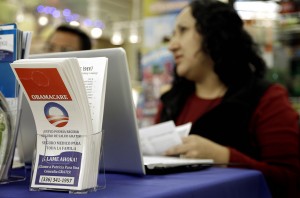
Associated Press
Associated Press
WINSTON-SALEM, N.C. — Between the avocado and grapefruit displays, Adolfo Briceno approaches customers in the bustling Hispanic supermarket to ask whether they have health insurance.
Turn left at the bucket of flower bouquets, he tells dozens of shoppers on a recent Saturday, to spot the table covered with the Blue Cross and Blue Shield of North Carolina logo and its Spanish-speaking agent.
A local Mexican music radio station is doing a live remote broadcast from outside the grocery and periodically mentioning Blue Cross, backing up a line of people curious about coverage in front of the harried agent.
Such atypical approaches to selling health insurance policies are playing out across the country since the second round of enrollment under the federal Affordable Care Act opened in mid-November. Insurance companies and some states are focusing heavily on signing up eligible Hispanics, a group that accounts for a large share of the nation’s uninsured but largely avoided applying for coverage during the first full year the health care reform law was in effect.
Hispanics accounted for just 11 percent of those who enrolled in the private policies sold during the initial sign-up period, which ended in March.
Substantially boosting the overall number of enrollees beyond the 6.7 million who signed up the first year will depend on reaching people who have been uninsured for years or never been insured, and that will mean heavily targeting Hispanic communities.
After talking to the Blue Cross agent while shopping at the Winston-Salem supermarket, Gabriela Camacho, 21, learned that policies for her 41-year-old mother and 46-year-old father will likely cost less than $100 a month each after government subsidies.
“We have a lot of bills from the hospital for my dad,” said Camacho, a military spouse whose health care is covered through her husband, a Marine stationed at Camp Lejeune.
Before chancing on the agent, she had seen billboards for Blue Cross, the state’s dominant insurer, during her drive from the Camp Lejeune area. The signs reminded her of the current enrollment period, which ends Feb. 15.
Jose and Virgen Cardosa were happily surprised to meet the Blue Cross agent at the store because they have lacked coverage since emigrating from Cuba last year. They have worried about how they would cope if one of them suffers an emergency health condition “and if you go (to a hospital) and they won’t take care of you,” Virgen Cardosa said through an interpreter.
The married couple heard about the sign up period on Spanish-language TV, she said.
President Barack Obama’s recent executive order dealing with immigrants not in the country legally, which in large part will help parents of children born in the U.S., will not make immigrants eligible to buy health insurance in federal exchanges set up under the health care law or to apply for tax credits that would lower the cost of insurance.
Still, reaching Hispanics who are eligible and persuading them to sign up are top priorities for the law’s supporters.
In North Carolina, Hispanics represented just 2 percent of the total enrolled during the first year. Hispanics are almost half New Mexico’s population but made up less than a third of the enrollees. In Nevada and New Jersey, Latino enrollment was 10 percentage points or more lower than their presence in the population.
Hispanics fared a bit better in Arizona, where they comprise 30 percent of the state’s population and made up 24 percent of enrollees.
The numbers do not offer a complete picture because applicants are not required to report their race or ethnicity.
Of the more than 10 million Hispanics eligible for coverage under the Affordable Care Act. During the first enrollment period, 80 percent were projected to be eligible for government subsidies that help lower monthly premiums, Medicaid in the states that opted to expand the program or coverage for their children, according to the U.S. Department of Health & Human Services.
A variety of factors have contributed to the relatively paltry sign-up numbers for Hispanics so far. Reports by the Urban Institute and the health research group of accounting and consulting firm PwC describe the fear of deportation for family members who are in the country illegally, language barriers, worries about privacy, concerns about affordability and a general unfamiliarity with insurance markets.
“Hispanics have tremendous consumer purchasing power, but our research shows that they have also been more likely than other consumers to delay health care, and don’t have great trust in the U.S. health system,” said Frank Lemmon, a PwC consultant who advises U.S. health care companies.





